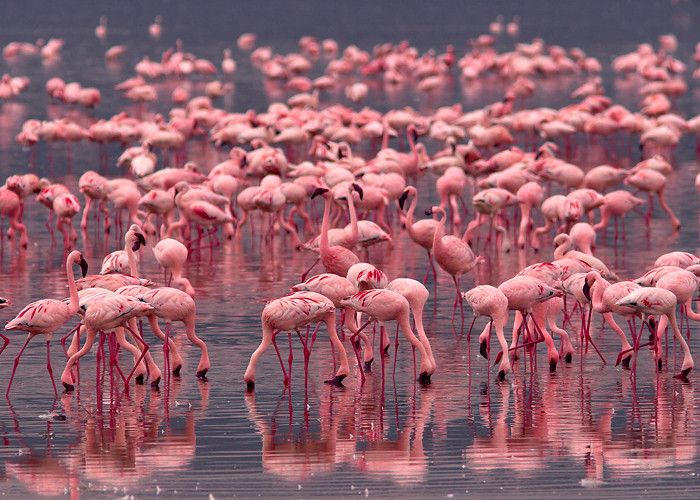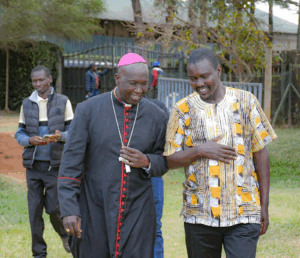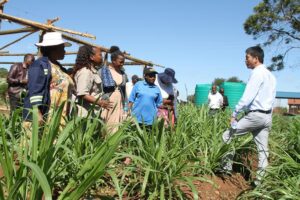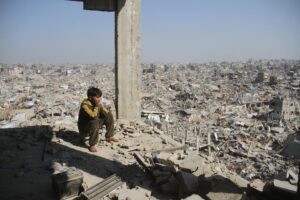THE FADING PINK OF LAKE NAKURU

By Philip Janet Kavutha
I recall my earliest school visit to Lake Nakuru National Park. The sight stole my breath. The coastline on the minibus window was not a coastline, but some moving, shimmering, impossible pink. The edge of the water was covered with a million flamingos, a breathing, living spectacle
that was worth a miracle. This was the crown jewel of Kenya, a pride place. Where you took the relatives who came up country to see the flamingos. It was what we did. It was who we were. Go to the lake today and that memory is aching with a sharp pain. The gorgeous pink ribbon is diminished. The great flocks, which they named the greatest bird spectacle on earth, are ghosts of their former selves. Even the squawks never made the silence more deafening than it is. Webserver it, we shake the head with sadness and then we move on. But we must not move on.
Lake Nakuru does not only tell an environmental tale, but it is a personal message to each and every one of us. This is the reality that we have to accept, we are killing our national treasures with our love. We are witnessing our heritage the very same land and water that makes us our Rift Valley getting ill and we are faking that it is just a temporary cold. We have erected a wall in our heads. On one side there is “development”, the farms, the factories, the growing towns of Nakuru and Naivasha. On the opposite side is the park, the lake, the animals, which is called “nature”. We pretend that these two worlds are different. But they are not. The lake is the bottom of a huge bowl, and all we do on the slopes of that bowl all the chemicals swept away by a farm, all the earth washed off a deforested hillside, all the litre of sewage emptied by a busting town all of it drains down. It flows straight out into the water, upon which the flamingos, rhinos and our own children depend. The lake turns out to be a mirror, and it is reflecting back upon us the effects of our deeds.
The Biblical wisdom makes sense to our grandparents when they read Galatians 6:7 “Do not be deceived, God cannot be mocked. A man reaps what he sows.” Let us consider what we have been sowing. We have planted pollution in our rivers and are harvesting a lake that is periodically asphyxed, periodically sometimes poisonous and that is a gradual but sure poison. We have planted deforestation on Mau Hills, and we are harvesting erratic downpours and silt water. We have planted the seed of apathy, turning a blind eye as our wetlands are snatched and constructed on, and we are reaping the loss of the flamingos due to habitat change by raising the water level, and by the pollution due to adjoining urbanization and climate change. We believed we would have everything without compromising. We believed that the beauty of the Rift Valley was so strong
that it could take any abuse. We are being proven wrong. We have the problem, it looks to us, but we seek to blame somebody. We indicate the great
flower gardens, but not our litter in the streets. We listen to the warnings, but we do not sense the urgency. We observe the water in the lakes leaping up to cover highways or receding to leave mudflats and we refer to it as an odd weather year, rather than a system in decay.
It’s time to make a change in this story. We should change our positions as spectators of this downfall to be the stewards of its resurrection. Lake Nakuru is not only a tourist resort, but it is our home barometer. Its health is our health. We should be the voices of the valley. We have to expect more of our leaders. Get your member of County Assembly to tell what they are doing to implement laws against pollution. Ask your
MP what they are doing to save the Mau Forest complex which is our water tower. It is not politics it is survival. Let us act in our own spaces. As a farmer, consider agro forestry. In Nakuru town, do not dispose of your waste carelessly should you be running a business there. As a family, quit dumping the plastic into the drains that flow to the lake. Make your children know the name of the flamingo in Swahili and tell them the story of how the lake was pink.
The great pink flock of my childhood might never come back in my life. And yet that is no reason to do nothing. It is what the children of our children will be able to see. Will they be familiar with the flamingo because of some fading picture on an old textbook? Or will they be loyal to a fair lake and make their own records of miracle? the choice is ours. The lake is waiting. We must not allow its dying colour to be the grey of our empathy.








